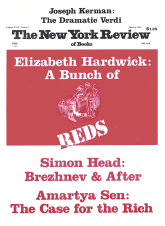In response to:
Comedy of Ignorance from the April 30, 1981 issue
To the Editors:
Michael Wood has written an extremely misleading review [NYR, April 30] of my book, Beckett and the Voice of Species: A Study of the Prose Fiction. With no attempt to view his subject at close range or to provide any information about its thesis, Wood bases judgments entirely on two or three word phrases quoted ludicrously out of context. Even his praise of the “shrewd and sensible comments” in my book is vacuous, because he gives us no idea what these comments are or to what perspective they belong. The one brief passage which he quotes approvingly is torn completely from the discussion it clarifies and hence cannot help the review reader.
My book springs from the conviction that Samuel Beckett is exploring, perhaps more profoundly than any other writer, human experience in our era. Now this phrase, “human experience,” sorely offends Wood; he finds such language “baggy.” Yet, whether he likes it or not, the triumph of great art is to illumine some part of human experience in a given age. Before it can do so however, the poles of experience, subject and object or self and world, must themselves be stably defined. The interpretation of these poles changes from age to age but their intelligibility is never doubted. My book shows how, for Beckett, the modern age no longer has access to such stable definitions. In their absence man is plunged into what he calls “the experience of Nothing”—an empty flux with no ability to interpret its own structure.
Beckett’s prose fiction, then, engages a revoluntionary mimetic project—the representation of an experience that belongs no longer to an individual but instead to the voice of our species, trying to precipitate again the poles of self and world. Discovering how to express the experience of Nothing, with decreasing dependence on conventional means of presenting experience in terms of subject and object, is perhaps Beckett’s greatest triumph. A 750 word limit prevents amplification here, but my book discusses in detail how, with each new text, Beckett evolves narrative strategies of extraordinary originality and complexity to express the experience of Nothing.
To this Wood can only respond, “Levy is not alone…in the view that doubt was unknown to man before the modern period.” Wood’s obtuseness is remarkable. He misses entirely the difference between ignorance and doubt. The whole thrust of Beckett’s prose fiction is toward that radical ignorance which is the experience of Nothing. Doubt always presupposes knowledge. Consider this passage from the chapter on How It Is:
The ambiguous phrase, “no doubt,” reveals a remarkable paradox in How It Is. Where there is no knowledge, there is no doubt. If I cannot know, then I know I cannot doubt. Again Augustine is overturned. His renowned proof of personal existence and identity—si fallor, sum (if I doubt, I am)—is impossible in the mud.
Moreover, Wood might profit from reading the detailed discussion of Beckettian ignorance in the chapter on Texts for Nothing.
One last point. Wood, again providing no context, sneers at the phrase, “easy confidence,” in connection with Proust. Does Wood have blackouts while skimming? That phrase occurs during a discussion in which I show how in How It Is the Beckettian narrator is trying to recapture the concept of time which is absent in the experience of Nothing:
We cannot speak of time in this context, for time is not a series of recurring moments. It is a succession, an ordered series, grounded in the assumption that experience leads somewhere, that each moment is a different moment, growing from the one preceding. How It Is represents a monumental effort to recapture time itself, not just the past. The easy confidence with which Proust explores time has long disappeared, and the narrator embarks on a quest that Proust never dreamed of—a literal recherche du temps perdu. To this end, the narrator employs every tactic possible.
The chapter goes on to pursue those tactics in what is surely an interesting and original way.
Wood accuses me of “empty generalizations,” but I should repeat that the only justification he gives for such a charge are those few two and three word phrases that he quotes entirely without context. He completely ignores the detailed and original discussion devoted to each text. Wood is pointing the finger in the wrong direction. As a reviewer, he himself is guilty of the worst kind of generalization: the judgment based on nothing but distortion, omission, and the refusal to deal at close range with a challenging book.
Eric P. Levy
University of British Columbia
Vancouver, Canada
Michael Wood replies:
I suppose there’s no appeasing a touchy author, but I really wasn’t sorely offended by anything in Mr. Levy’s book. I do find the phrase “human experience in our era” baggy to the point of meaninglessness. “The triumph of great art is to illumine some part of human experience in a given age.” A streetlamp will do that. And I am surprised that Mr. Levy chooses to boast of having attributed easy confidence to Proust. Perhaps he ought to be reading Proust instead of quarreling with me.
This Issue
March 4, 1982



